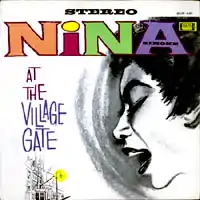| Nina Simone at the Village Gate | ||||
|---|---|---|---|---|
 | ||||
| Live album by | ||||
| Released | January 15, 1962 | |||
| Recorded | March 1961 | |||
| Venue | The Village Gate, New York City | |||
| Genre | Vocal, jazz, blues, folk | |||
| Length | 44:47 | |||
| Label | Colpix CP 421 (mono), SCP 421 (stereo) | |||
| Producer | Cal Lampey | |||
| Nina Simone chronology | ||||
| ||||
Nina Simone at the Village Gate is a live album by singer / pianist / songwriter Nina Simone. Released in early 1962, it was her third live album for Colpix (and sixth album overall). The album was recorded at The Village Gate, a nightclub in Greenwich Village, New York in late March 1961, nearly a year before it saw release.[1] The original release featured eight of the twelve songs performed at the gig. In 2005, an extended version of the album was released with the four remaining tracks.[2][3]
| Review scores | |
|---|---|
| Source | Rating |
| AllMusic | |
| Gaslight Records | |
| Record Mirror | |
Background
It is particularly notable for the number of folk songs and African related songs on the album early in Simone's career. Richard Pryor had one of his first nights as a comedian opening for her.[7]
Use in media
- "Just in Time" was used at the end of the movie Before Sunset (2004).
Critical reception
The record received a glowing response when reviewed in 2012 by Gaslight Records, being given a rating of 9.5/10. The reviewer highlighted the "rawness of the recording technique", stating that it catches the "incredible atmosphere" of the nightclub and succeeds in presenting "a young Nina Simone in her most real and free flowing state yet and this is perhaps most apparent in the way that her flawless vocal along with her innovative and dynamic piano playing shine through as effortless and unrivalled abilities without any need for recording studio gloss or trickery."[5] AllMusic's reviewer stated that "Nina Simone, who was always in a category by herself, is heard throughout in her early prime," and that she "has the rare ability of really being able to dig into material and bring out unexpected meaning in familiar lyrics."[4]
Track listing
| No. | Title | Writer(s) | Length |
|---|---|---|---|
| 1. | "Just in Time" | 6:34 | |
| 2. | "He Was Too Good to Me" | 4:52 | |
| 3. | "House of the Rising Sun" |
| 4:37 |
| 4. | "Bye Bye Blackbird" (instrumental) | 8:15 |
| No. | Title | Writer(s) | Length |
|---|---|---|---|
| 5. | "Brown Baby" | Oscar Brown | 5:46 |
| 6. | "Zungo" | Babatunde Olatunji | 3:00 |
| 7. | "If He Changed My Name" | Robert MacGimsey | 3:58 |
| 8. | "Children Go Where I Send You" | Traditional; arranged by Nina Simone | 7:45 |
| Total length: | 44:47 | ||
| No. | Title | Writer(s) | Length |
|---|---|---|---|
| 9. | "Eretz Zavat Chalav U'dvash" | Eliahu Gamiel | 7:10 |
| 10. | "Vaynikehu" | Gil Aldema | 2:18 |
| 11. | "Sinnerman" | Traditional; arranged by Nina Simone | 7:57 |
| 12. | "You'll Never Walk Alone" |
| 5:30 |
| Total length: | 67:42 | ||
Personnel
- Nina Simone – vocals, piano
- Al Schackman – guitar
- Chris White – bass
- Bobby Hamilton – drums
References
- ↑ Cohodas, Nadine (2010). Princess Noire: The Tumultuous Reign of Nina Simone. Chapel Hill: The University of North Carolina Press. p. 111-112.
- ↑ "Nina Simone at the Village Gate". Jazz Messengers. Retrieved 27 December 2022.
- ↑ "Nina Simone at the Village Gate". King International. Retrieved 27 December 2022.
- 1 2 Yanow, Scott. "Review". AllMusic. Retrieved 8 April 2016.
- 1 2 "Album review". Gaslight Records. 2 January 2012. Archived from the original on 24 February 2015.
- ↑ Jones, Peter; Jopling, Norman (5 February 1966). "Nina Simone: At The Village Gate" (PDF). Record Mirror. No. 256. p. 8. Archived from the original (PDF) on 1 April 2022. Retrieved 22 August 2022.
- ↑ Simone about Pryor's first night: “He shook like he had malaria, he was so nervous. I couldn't bear to watch him shiver, so I put my arms around him there in the dark and rocked him like a baby until he calmed down. The next night was the same, and the next, and I rocked him each time.” In: Nina Simone & Stephen Cleary, I Put a Spell on You, pp. 70–71